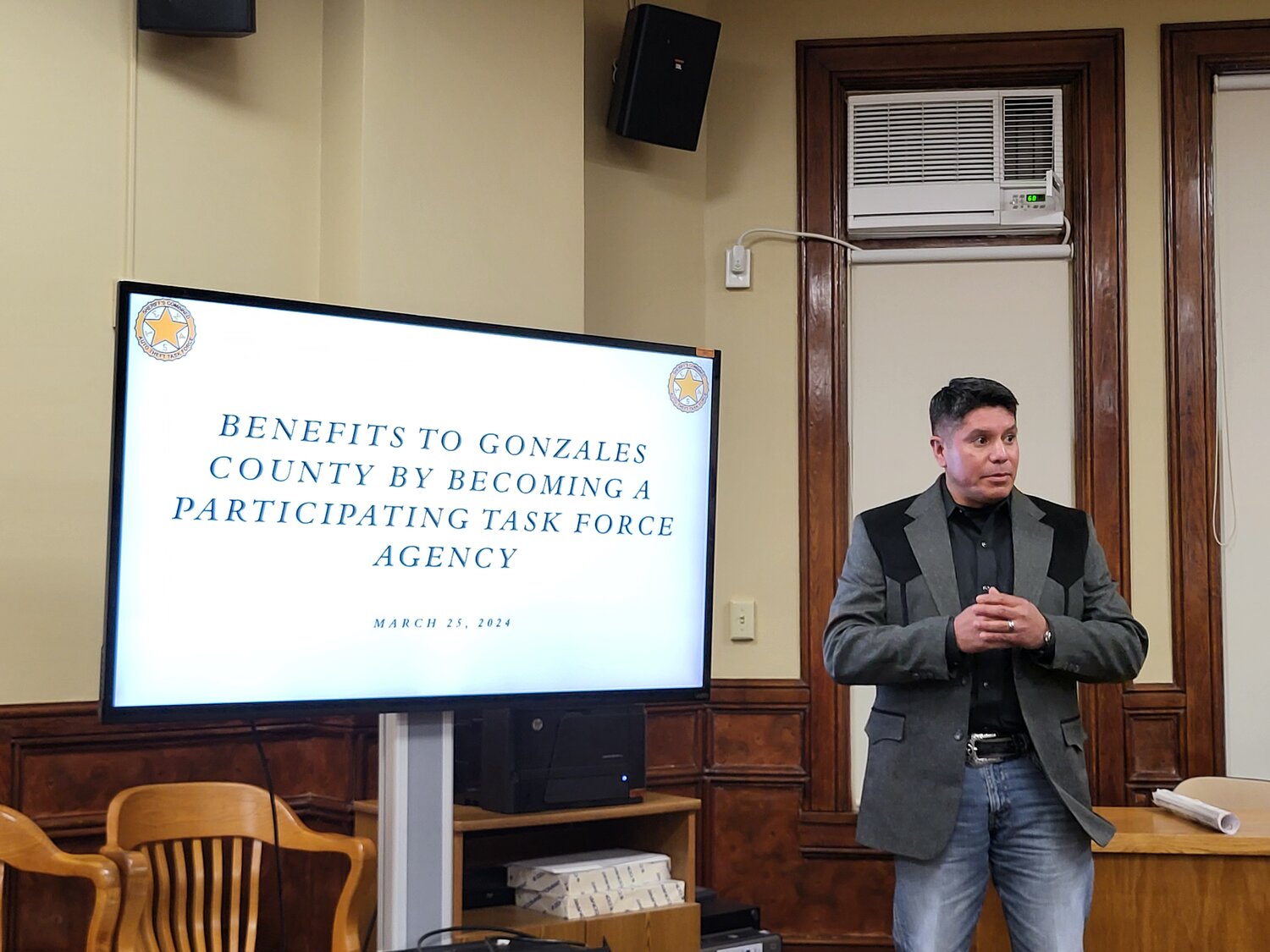Commissioners hear presentation on duties, benefits of SCATTF membership
Gonzales County commissioners heard a presentation from the task force commander for the Sheriff’s Combined Auto Theft Task Force (SCATTF) at the request of Gonzales County Sheriff Keith Schmidt during the regular court meeting Monday, March 25.
Schmidt has asked the court to consider joining the task force as a full participating member, which would require the county to hire a deputy specifically to work auto theft cases, though the majority of that cost would be reimbursed through grant funds.
After the presentation, court members voiced their desire to hold off on joining the task force at this time until they can look at their available resources during the next budget cycle.
Schmidt introduced SCATTF commander Sgt. Andy Viruette, who was also joined by agent Ron Williams and specialist/analyst Alicia Machado. Viruette explained how SCATTF works to solve and prevent auto theft crimes as well as educate the public.
Viruette is a sergeant with the Travis County Sheriff’s Office and is in his first year as SCATTF task force commander, though he has been a law enforcement veteran for more than 20 years.
SCATTF receives grant funds from the state through the Motor Vehicle Crime Prevention Authority, which is funded by a $5 fee generated on motor vehicle insurance policies issued within the state of Texas. Most counties in the state belong to one or more of the 24 task forces that are MCVPA grantees. Travis County manages SCATTF.
“(MVCPA) is a collaborative effort of not just law enforcement, but other entities,” Viruette said. “There's law enforcement groups, prosecutors, insurance industry and local tax assessor/collectors. Basically, this whole group was created as an initiative to combat auto theft and motor vehicle crimes. Through that, the state provides and awards financial grants to these agencies.”
The 14 counties which are encompassed currently by SCATTF are Bell, Blanco, Caldwell, Colorado, Comal, Fayette, Gonzales, Guadalupe, Hays, Jackson, Lee, Milam, Travis and Wilson counties. The task force is comprised of Viruette, as the task force commander, as well as 11 investigators (agents), a community liaison and a law enforcement specialist/analyst.
Viruette said since its inception, task forces funded by MVCPA have reduced motor vehicle theft in the state by more than 60 percent and increased the recovery of stolen vehicles by 20 percent. The total value of vehicles and other property recovered by these task forces is in excess of $11.6 billion.
He said the different task forces are designed to work together with each other as a function of the grant program — there are no “blurred lines” of jurisdiction.
“Just Friday, I received a call from the task force commander over in Beaumont,” Viruette said. “They were talking to us about a vehicle that they wanted us to go take a look at because it was released and it turned out the vehicle was what we call in our industry a ‘clone.’ It had a fake VIN (vehicle identification number) on it that it had been masked for a vehicle that had been stolen.
“This is Beaumont saying, ‘Hey, can y'all go look at it in your jurisdiction, and in this case it is in Travis County, and let us know, for one, if the vehicle is there and then, for two, make contact with them.’”
“We also work closely with Mexico because a lot of our vehicles end up south, especially with y'all being here in a ranching community, a lot of these vehicles stolen from here are being found toward the south,” Viruette said.
Gonzales County is currently a coverage county but in order to be a full member or participating, like Travis or Hay counties, the county would need to supply a full-time agent deputy that would be a member of the task force.
The salary and fringe benefits for that deputy would be reimbursable through MVCPA grant funds at a rate of 80 percent, with the county being responsible for 20 percent of the cost, as long as 100 percent of the agent’s time is dedicated to auto theft-related duties or training. Any work performed outside that area would not be reimbursable.
“That basically means that if my agent here, if he works Monday through Thursdays, then 100 percent of his time has to be dedicated to auto theft,” Viruette said. “If he gets pulled for some reason as as an agent, if our agency is understaffed and he is pulled to go work patrol, well, then that is on that agency to have to take up that cost for that work day of that agent, because now he's no longer doing his assigned functions. Now, he's working in a different capacity.”
The participating agency (GCSO) would also be responsible for providing the deputy a vehicle to use in the course of his duties. However, investigative equipment and uniforms as well as auto theft-related training, conferences, travel and any per diem would all be covered by SCATTF.
All reimbursement from SCATTF and MVCPA is done on the back end, not paid in front. And the county cannot supplant. This means they cannot use existing resources as a cash match or use grant funds to replace other funds that would otherwise have been available to use for the same purpose or program.
“Specifically, jurisdictions may not reduce the amount that they spend for motor vehicle burglary and theft by moving costs of personnel into a grant funded position,” Viruette said.
Viruette said task force agents work as a unified group within the 14-county region and could be required to leave their home county when needed to work theft investigations and temporarily work out of any office within the coverage area.
Comments







